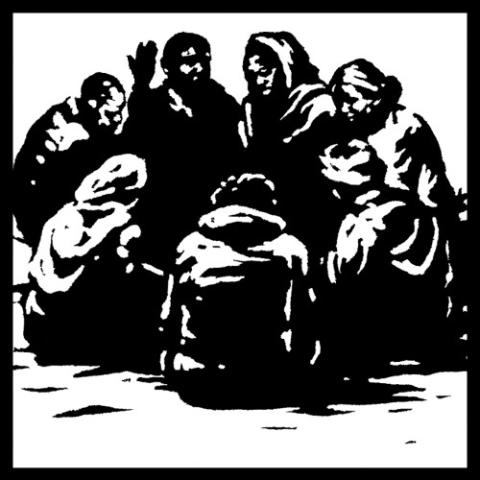
(Pixabay/Creative Commons)
Teachers of deaf children explain that when a child with a severe hearing impairment closes her eyes, she effectively cuts off all communication from the outside. With a distinct advantage over hearing children who must just pretend they don't see or hear, she can prevent any new information from penetrating her world.
She's the miniature image of the scribes of today's Gospel who accused Jesus of wielding diabolical power. They had made their judgment and they would allow nothing — no good works, no life-giving message, no joy — to modify their opinion. They knew sinful activity when they saw it!
Jesus called that attitude blasphemy against the Holy Spirit. It's an equal opportunity sin, as attractive to entrenched liberals as to their mirror-image, die-hard conservative brothers and sisters. It's a form of idolatry through which we divinize our own opinion or dogma, refusing to allow God or anyone to break through to broaden our vision.
Jesus calls this unforgiveable because people who willingly imprison themselves in an ideology wall themselves off from grace and initiate their own rigor mortis. It's a vicious cycle malady, self-reinforcing because they interpret any question that could give them a key to freedom as a temptation to be rigidly avoided.
Jesus' condemnation of that sort of attitude was the harshest critique he spoke in the Gospels. He directed it at people who had so entrapped themselves that they would only go from bad to worse, eventually plotting his crucifixion.
The scribes who blasphemed against the Holy Spirit were the extremists in today's Gospel. The other group whose misjudgment we hear about, a group that may have caused Jesus at least as much sorrow, was his family. It's hard to imagine what they were going through. Jesus, the son and brother who had apparently seemed like an average son of Joe, had suddenly become a controversial public figure and was angering the big- and small-time authorities. They must have had some sort of family meeting that resulted in the troop of relatives who set off to find him and bring him home to his senses.
The family got as far as the door of the house where Jesus was staying, but instead of going inside, they remained as outsiders and sent a message that they were seeking him. Mark sets this up to show us that they weren't so much seeking Jesus as looking for a way to convince him to get back to normal. They had their idea about who he should be as a member of the family and he was not conforming.
The problem they were grappling with is key to the Gospel: Do you accept Jesus on his terms or will you only accept a Messiah who fulfills your expectations?

(Mark Bartholomew)
Jesus responded to his family like representatives of all of Israel awaiting the Christ. He proclaimed that his closest ties were not forged by blood or heritage, nor by formal religious affiliation or nationality. He said his real kin were those who related to God in the same way that he did. They were the people who gave him life and whom he would protect as he would protect his mother, the people whom he could treat as co-heirs with him to everything the Father promised. They shared the real source of life with him.
Today we are invited to put ourselves in the Gospel scene and decide with whom we would be standing.
We might be inside the house listening to Jesus, wondering what it is all about, worried that we will have to take a stand. Some of us might admit that we are occasionally trapped with the dogmatic demonizers who say, "Nothing will change my mind." Others might be with the family who just can't believe God would want things to change so much and, therefore, are praying that everything can just get back to normal.
No matter which group we identify with, Mark tells us this story to show that Jesus offers us a place in the inner circle. Becoming a part of that circle will demand that we drop all claim to importance based on race, gender, ethnicity, nationality, profession, economic status, etc. We also have to learn to grasp our certainties loosely, willing to let additional revelation upend them and us.
Advertisement
As Pope Francis said in July 2016, we are called to give up "all motives of personal pride, of careerism or hunger for power … becoming humble instruments of salvation worked by Jesus' own sacrifice."
When we do that, we will stop resembling the children who try to blot out reality by closing their eyes and covering their ears. Only then will we be able to hear the Lord call us brother, sister, mother, friend.
[Mary M. McGlone is a Sister of St. Joseph of Carondelet who is writing the history of the Sisters of St. Joseph in the U.S.]
Editor's note: This Sunday scripture commentary appears in full in NCR's sister publication Celebration, a worship and homiletic resource. Request a sample issue at CelebrationPublications.org. Sign up to receive email newsletters every time Spiritual Reflections is posted.








